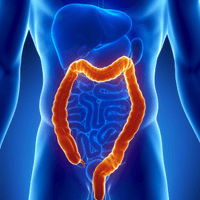
The American Institute for Cancer Research is doing everything they can to slash cancer rates in the country. Here’s what they have to say about how you can cut your risk of colon cancer through the choices you make every day.
 If current trends continue, one in twenty Americans will be diagnosed with colorectal cancer over the course of his/her life. Yet the latest research shows that Americans can prevent tens of thousands of these cancers through what we eat, how much we weigh, and how much we move, say experts at the American Institute of Cancer Research.
If current trends continue, one in twenty Americans will be diagnosed with colorectal cancer over the course of his/her life. Yet the latest research shows that Americans can prevent tens of thousands of these cancers through what we eat, how much we weigh, and how much we move, say experts at the American Institute of Cancer Research.
“Research now shows that 45 percent of colorectal cancers in the United States are preventable each year through diet, staying a healthy weight, and being physically active,” says AICR Registered Dietitian Alice Bender. “That’s about 64,000 cases every year.”
In March, For National Colon Cancer Awareness Month, Bender shared six evidence-based steps you can take to reduce your risk.
Recommendations to reduce the risk of colorectal cancer stem from AICR and World Cancer Research Fund’s 2010 Continuous Update Project (CUP) Report: Colorectal Cancer. The report is the most comprehensive ever published on the link between cancer risk and lifestyle.
“Shifting into these healthy habits isn’t easy, but there are concrete steps you can take now to reduce your risk for colorectal and many other cancers,” says Bender.
1. Fit activity into your day
From housecleaning to running, the latest report finds that moderate physical activity – of all types – reduces the risk of colon cancer. (There was insufficient evidence to make a similar conclusion regarding rectal cancer.)
Starting Step: Find 10 minutes today to move. Whether taking a break at work or while watching TV, you can jog in place, walk the stairs, do push-ups or chair exercises. Build on that over time by taking more activity breaks or extending the 10 minutes to 30 minutes.
2. Stay a healthy weight and watch out for belly fat
One of the key findings from the CUP report is that excess body fat is linked to increased risk of colorectal cancer. The report also concludes that carrying excess belly fat – regardless of your weight — is a risk factor for colorectal cancer.
Starting Step: Become portion-size savvy. Choose smaller servings of calorie-packed foods like meats, cheese, juice and nuts. Limit desserts and sweets to two or three times a week in small portions.
3. Eat plenty of fiber
Today, the evidence is clearer than ever: eating a diet high in fiber can reduce the risk of colorectal cancer. For every 10 grams of fiber consumed daily – slightly less than a cup of beans – the risk of colorectal cancer is reduced by 10 percent.
Starting Step: Move to the AICR New American Plate way of eating: fill two-thirds of your plate with vegetables, fruits, whole grains, beans and nuts and no more than one-third with animal protein such as poultry or lean red meat.
4. Cut the red meat; avoid the processed
The latest CUP finding reaffirms earlier evidence: eating too much red meat and processed meat increases colorectal cancer risk. The report shows that ounce for ounce, consuming processed meat increases the risk twice as much as consuming red meat. Processed meats include hot dogs, bacon, sausage and deli meats.
Starting Step: Limit red meat consumption to 18 ounces per week – roughly the equivalent of five or six small cooked portions of beef, lamb or pork – and avoid processed meat. Try fresh roasted chicken breast, hummus or peanut butter for sandwiches.
5. Go moderate on the alcohol
The CUP report finds convincing evidence that drinking alcohol increases colorectal cancer risk in men and it probably increases the risk in women. When it comes to cancer risk, the best advice is: If you don’t drink, don’t start. For people who already drink, AICR recommends limiting alcohol to no more than two standard drinks daily for men; one for women.
Starting Step: Become aware of how much a standard drink is by measuring the following amounts and pouring it into your glassware: 5 ounces of wine, 12 oz. beer and 1.5 ounces of liquor.
6. Enjoy plenty of garlic
The CUP report judgment of the evidence suggests that a diet filled with relatively high amounts of garlic reduces the risk of colorectal cancer.
Starting Step: Add chopped garlic to stews, stir-fries, vegetables and roasted meats. Chop the garlic then wait 10-15 minutes before cooking in order to activate the health-promoting ingredients.
– Sharon Palmer R.D.
As a registered dietitian with 16 years of health care experience, she focuses on writing features covering health, wellness, nutrition, cooking, wine, restaurant reviews, and entertainment. Over 750 of Sharon’s features have been published in a variety of publications. Her recent book The Plant-Powered Diet: The Lifelong Eating Plan for Achieving Optimal Health, Beginning Today can be ordered here.

